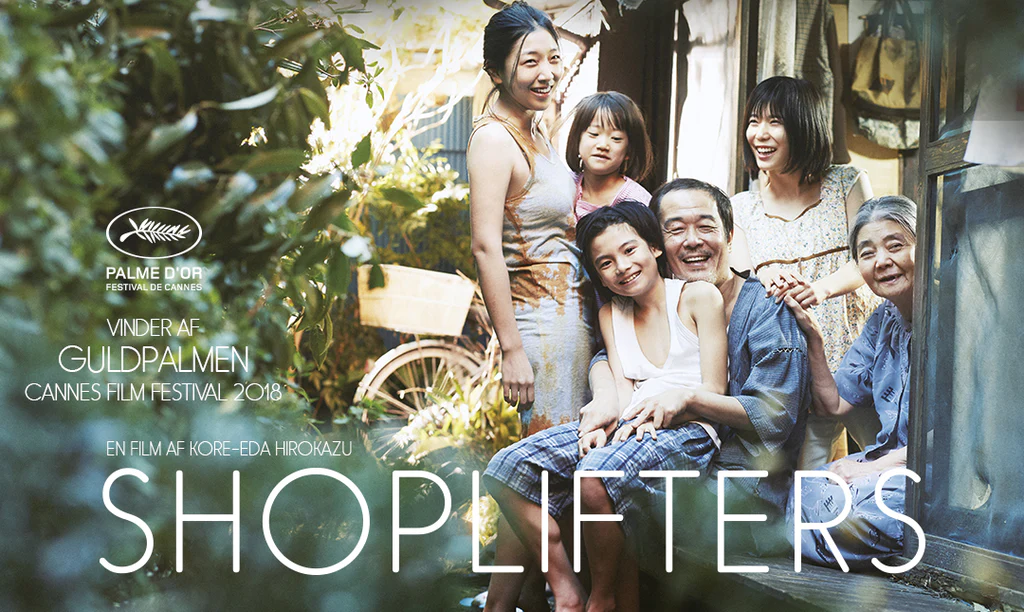Introduction:
“Shoplifters,” directed by Hirokazu Kore-eda, stands as a masterful piece of Japanese cinema that delves into the intricate dynamics of a non-traditional family. Released in 2018, the film follows a group of individuals who, connected by circumstance rather than blood, form a makeshift family engaged in unconventional survival methods. Through the lens of the Shoplifters, Kore-eda intricately explores themes of love, morality, and the meaning of family in contemporary Japanese society. In this comprehensive exploration, we unravel the narrative complexities, cultural nuances, and the emotional impact that “Shoplifters” has left on audiences worldwide.

Chapter 1: The Unconventional Family Unit
1.1 The Shibata Family
“Shoplifters” introduces us to the Shibata family, residing in the outskirts of Tokyo. Osamu (Lily Franky) and Nobuyo (Sakura Ando) head the household, which includes Aki (Mayu Matsuoka), Shota (Jyo Kairi), and Hatsue (Kirin Kiki). The family’s unconventional structure becomes apparent as they engage in shoplifting to make ends meet, challenging societal norms of familial relationships.
1.2 Bonds Beyond Blood
Central to the film’s exploration is the concept of chosen families—individuals who, despite lacking blood ties, form deep emotional connections and support systems. The Shoplifters embody this notion, relying on each other for both emotional and economic sustenance. The narrative invites reflection on the nature of familial bonds and the extent to which they transcend traditional definitions.
Chapter 2: Survival and Morality
2.1 Shoplifting as Survival
The act of shoplifting becomes a metaphor for the family’s survival strategy. As they navigate poverty and societal marginalization, the Shibatas resort to theft as a means of obtaining necessities. The film raises questions about the morality of such actions and challenges viewers to empathize with characters whose choices are driven by desperation rather than criminal intent.
2.2 Moral Complexity
“Shoplifters” is characterized by moral complexity, as Kore-eda refrains from moralizing the actions of the characters. Instead, he presents a nuanced portrayal that encourages audiences to question preconceived notions of right and wrong. The film challenges the audience’s moral compass, blurring the lines between legality and compassion.

Chapter 3: Layers of Deception and Truth
3.1 Hidden Truths
As the narrative unfolds, hidden truths about the characters and their relationships come to light. The film explores the consequences of concealing one’s past and the impact of such secrecy on interpersonal relationships. The layers of deception add depth to the characters, contributing to the overall richness of the storytelling.
3.2 Interconnected Fates
“Shoplifters” masterfully weaves the interconnected fates of its characters, revealing the intricate web of circumstances that led them to form a family. The film’s narrative structure unfolds like a puzzle, with each piece contributing to a larger picture of human connection, vulnerability, and the shared experience of marginalization.
Chapter 4: Cultural Context and Japanese Society
4.1 Social Commentary
Kore-eda embeds “Shoplifters” with social commentary on contemporary Japanese society. The film sheds light on issues of poverty, economic inequality, and the societal pressures that drive individuals to the margins. The Shoplifters, in their unconventional existence, become a mirror reflecting the struggles faced by those on the fringes of society.
4.2 Reflections on the Concept of Family
The film’s exploration of family goes beyond the immediate narrative, prompting viewers to reflect on the broader cultural context. “Shoplifters” challenges the traditional Japanese emphasis on blood ties and filial duty, inviting contemplation on the evolving nature of family structures in modern Japan.
Chapter 5: Performances and Directorial Craftsmanship
5.1 Ensemble Cast
The performances of the ensemble cast contribute significantly to the film’s impact. Lily Franky and Sakura Ando deliver compelling portrayals as the parental figures, conveying a blend of love, resilience, and moral ambiguity. The child actors, particularly Jyo Kairi and Mayu Matsuoka, add authenticity to the family dynamic, making the characters relatable and empathetic.
5.2 Kore-eda’s Direction
Hirokazu Kore-eda’s direction in “Shoplifters” showcases his trademark sensitivity and attention to detail. The director employs a quiet and contemplative style, allowing the characters’ emotions to unfold organically. The film’s cinematography, helmed by Ryuto Kondo, captures the mundane beauty of everyday life, elevating the ordinary to the realm of the extraordinary.
Chapter 6: Critical Acclaim and Awards
6.1 Cannes Film Festival Recognition
“Shoplifters” premiered at the Cannes Film Festival in 2018, where it received the Palme d’Or, the festival’s highest honor. The recognition at Cannes marked a significant moment for Japanese cinema, propelling Kore-eda and his film into the global spotlight.
6.2 Academy Awards Nomination
The film received an Academy Award nomination for Best Foreign Language Film at the 91st Academy Awards, further solidifying its status as a cinematic achievement. While it did not win the Oscar, the nomination underscored the international acclaim and recognition “Shoplifters” garnered.
Conclusion: A Touching Ode to Humanity
In conclusion, “Shoplifters” stands as a touching ode to humanity, inviting audiences to explore the complexities of love, morality, and the unconventional bonds that define family. Kore-eda’s directorial craftsmanship, coupled with powerful performances, creates a film that resonates on both an emotional and intellectual level. “Shoplifters” is not just a story about shoplifting; it is a narrative that delves into the essence of what it means to be a family and the lengths individuals go to for connection and survival.
Film Evaluation: “Shoplifters” is a cinematic masterpiece that transcends cultural boundaries, offering a universal narrative that resonates with audiences globally. Kore-eda’s storytelling finesse, coupled with exceptional performances, crafts a film that lingers in the hearts and minds of viewers. “Shoplifters” is a testament to the power of cinema to illuminate the human condition, prompting reflection on the intricate threads that bind us all in the tapestry of existence. In the canon of Japanese cinema, “Shoplifters” stands as a timeless exploration of compassion, resilience, and the shared humanity that unites us all.


